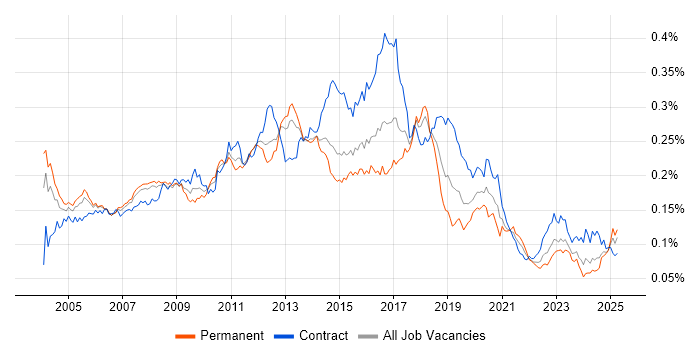Microsoft Developer
UK
The median Microsoft Developer salary in the UK is £70,000 per year, according to job vacancies posted during the 6 months leading to 30 May 2025.
The table below provides salary benchmarking and summary statistics, comparing them to the same period in the previous two years.
| 6 months to 30 May 2025 |
Same period 2024 | Same period 2023 | |
|---|---|---|---|
| Rank | 656 | 860 | 876 |
| Rank change year-on-year | +204 | +16 | +259 |
| Permanent jobs requiring a Microsoft Developer | 53 | 52 | 86 |
| As % of all permanent jobs advertised in the UK | 0.096% | 0.050% | 0.089% |
| As % of the Job Titles category | 0.11% | 0.053% | 0.097% |
| Number of salaries quoted | 40 | 49 | 62 |
| 10th Percentile | £56,125 | £34,000 | £44,000 |
| 25th Percentile | £64,063 | £44,942 | £55,313 |
| Median annual salary (50th Percentile) | £70,000 | £45,828 | £61,250 |
| Median % change year-on-year | +52.75% | -25.18% | +6.52% |
| 75th Percentile | £82,813 | £62,500 | £72,500 |
| 90th Percentile | £87,500 | £75,000 | £79,875 |
| UK excluding London median annual salary | £70,000 | £45,414 | £57,500 |
| % change year-on-year | +54.14% | -21.02% | +15.00% |
All Permanent IT Job Vacancies
UK
For comparison with the information above, the following table provides summary statistics for all permanent IT job vacancies. Most job vacancies include a discernible job title that can be normalized. As such, the figures in the second row provide an indication of the number of permanent jobs in our overall sample.
| Permanent vacancies in the UK with a recognized job title | 50,066 | 97,923 | 88,829 |
| % of permanent jobs with a recognized job title | 90.36% | 94.81% | 91.43% |
| Number of salaries quoted | 26,124 | 69,761 | 56,179 |
| 10th Percentile | £28,750 | £28,500 | £32,500 |
| 25th Percentile | £40,750 | £38,500 | £45,000 |
| Median annual salary (50th Percentile) | £55,000 | £52,500 | £60,000 |
| Median % change year-on-year | +4.76% | -12.50% | - |
| 75th Percentile | £73,750 | £70,000 | £80,000 |
| 90th Percentile | £95,000 | £90,000 | £100,000 |
| UK excluding London median annual salary | £51,000 | £50,000 | £53,500 |
| % change year-on-year | +2.00% | -6.54% | +6.63% |
Microsoft Developer
Job Vacancy Trend
Job postings that featured Microsoft Developer in the job title as a proportion of all IT jobs advertised.

Microsoft Developer
Salary Trend
3-month moving average salary quoted in jobs citing Microsoft Developer.
Microsoft Developer
Salary Histogram
Salary distribution for jobs citing Microsoft Developer over the 6 months to 30 May 2025.
Microsoft Developer
Top 14 Job Locations
The table below looks at the demand and provides a guide to the median salaries quoted in IT jobs citing Microsoft Developer within the UK over the 6 months to 30 May 2025. The 'Rank Change' column provides an indication of the change in demand within each location based on the same 6 month period last year.
| Location | Rank Change on Same Period Last Year |
Matching Permanent IT Job Ads |
Median Salary Past 6 Months |
Median Salary % Change on Same Period Last Year |
Live Jobs |
|---|---|---|---|---|---|
| England | +155 | 49 | £70,000 | +52.75% | 99 |
| Work from Home | +133 | 38 | £70,000 | +52.75% | 13 |
| UK excluding London | +180 | 26 | £70,000 | +54.14% | 94 |
| London | +126 | 23 | £70,000 | -6.67% | 17 |
| Midlands | +87 | 11 | £70,000 | +30.23% | 18 |
| West Midlands | +57 | 9 | £70,000 | +30.23% | 8 |
| South East | +89 | 7 | £70,000 | +52.75% | 33 |
| North of England | +44 | 7 | £70,000 | +55.56% | 19 |
| North West | +11 | 4 | £70,000 | - | 10 |
| Yorkshire | +61 | 2 | £75,000 | +25.00% | 7 |
| East Midlands | - | 2 | £65,500 | - | 9 |
| South West | +105 | 1 | £32,500 | -45.83% | 9 |
| North East | +36 | 1 | £85,000 | +88.89% | 2 |
| Northern Ireland | - | 1 | £60,000 | - | 1 |
Microsoft Developer Skill Set
Top 30 Co-occurring Skills and Capabilities
For the 6 months to 30 May 2025, Microsoft Developer job roles required the following skills and capabilities in order of popularity. The figures indicate the absolute number co-occurrences and as a proportion of all permanent job ads featuring Microsoft Developer in the job title.
|
|
Microsoft Developer Skill Set
Co-occurring Skills and Capabilities by Category
The follow tables expand on the table above by listing co-occurrences grouped by category. The same employment type, locality and period is covered with up to 20 co-occurrences shown in each of the following categories:
